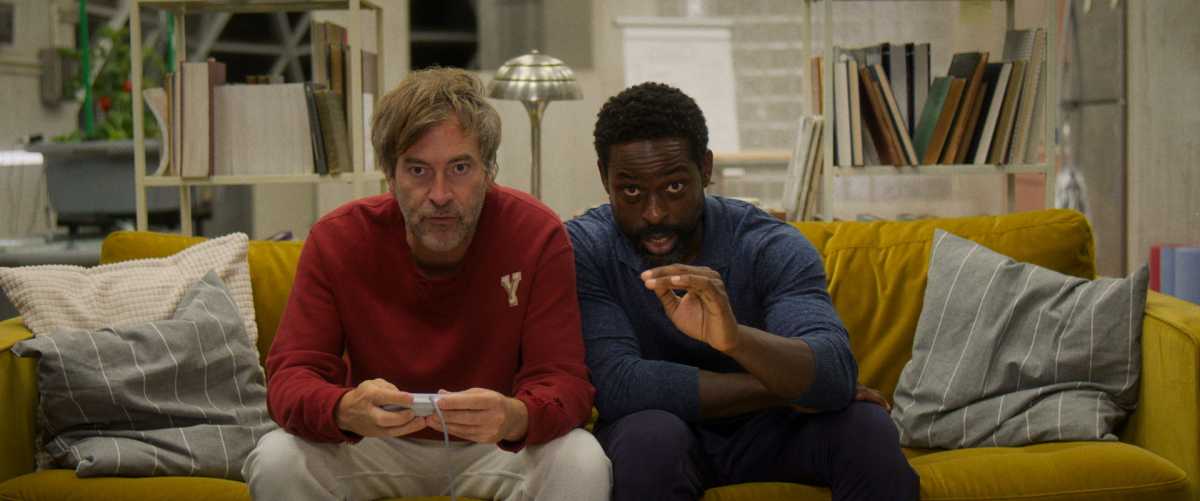(Note: this review contains spoilers for “Biosphere.” They begin at the fourth paragraph.)
“Biosphere” begins as post-apocalyptic sci-fi and winds up as a comedy about heterosexual men’s anxieties about queerness, gender, and their bodies. Here, the end of the world opens up new possibilities for its sole characters, former president Billy (Mark Duplass) and his advisor and lifelong friend Ray (Sterling K. Brown), as they live together under a dome. Friends since high school, their bromance skirts the edges of romance. They sleep in the same bedroom. Their bickering has the edge of an old married couple arguing. Queer director Mel Eslyn, who wrote the script with Duplass, knows what she’s doing, down to the allusions to the history of interracial buddy movies.
Ray designed the dome that has kept him and Billy alive. The nature of the catastrophe is unspecified, but a mysterious green light glows outside. Despite the circumstances, they live in relative comfort, enough to pass their days jogging and arguing about “Super Mario Brothers.” They’ve survived by maintaining a vegetable garden and tank of fish, but the fish need to replenish themselves by spawning and giving birth to new generations. In order for the men to continue having enough food, their current situation, in which all of the remaining fish are female, seems untenable, but one of the fish changes sex.
The relationship between Billy and Ray has been carefully constructed. Despite knowing each other since their school days, the power dynamic between them is unmistakable. Billy has the ability to slack off while Ray does the true work. This is reflected in Billy’s uncombed hair and perpetual stubble, which make him look like an overgrown teenage gamer.
Frankly, his prior life as a politician is a fictional conceit. The script and Duplass’ performance could have done much more to hint at an inner ambition. (Ray eventually reveals his deep secret: He’s a registered Democrat, despite working for the Republican Billy.) Even under this apocalyptic scenario, he has the privilege to fall upward. “Biosphere” is a modern version of “The Odd Couple,” despite the futuristic setting, but the fact that Billy is white and Ray is Black gives the former’s expectation that the latter will take care of him an uneasy twist.
While it’s best to go into “Biosphere” without knowing its plot twists, it would be impossible to write about its themes of without revealing what takes place after its first half hour. Just as the fish start to change sex, the same process happens to Billy. He notices his penis shrinking and grows breasts. He goes through female puberty late in life, beginning to have a period. It occurs to him that he should try to get pregnant to allow the human race to continue, but he and Ray are very reticent about having sex. “Biosphere” takes a gentle axe to the idea that transgender identity is something new, artificial, and technologically driven. Two percent of fish species do indeed change sex.
The production’s small scale is a product of the time it was shot, during the summer of 2021. However, it also pushes the 2000s mumblecore films that got Duplass, who started out co-directing with his brother Jay, into his current position as a producer towards new direction. The original mumblecore canon consisted of a small group of micro-budget movies about straight white people in big cities. Even Lynn Shelton’s 2009 “Humpday,” in which Duplass played one of two heterosexual men who decide to have sex together for an amateur porn video, didn’t go all the way with the queerness of its premise. While “Biosphere” is extremely reticent in terms of what it shows — maybe the prospect of a prosthetic body of Billy would risk becoming another kind of fat suit — it goes much further conceptually. This delicacy also feels attuned to the characters’ discomfort.
Billy and Ray never would’ve gone beyond bromance if they weren’t forced to live together under the dome, but their willingness to have sex just brings out something implicit in their relationship. Trans audiences have frequently found resonance in science fiction and horror films never intended as deliberate allegories of their experiences. “Biosphere” dodges the emphasis on pain in so many trans narratives by using genre to tell a far more ambiguous and fanciful story. (This extends to the soundtrack: composers Saunder Jurriaans and David Bensi’s acapella vocal score, used over visual transitions, is alien yet familiar, as though the Beach Boys had been transplanted from 1963 to the future.) The sci-fi scenario allows the couple to avoid the difficulty of defining themselves publicly in a way that’s presentable to the larger world. Its insistence on keeping things light, in such difficult times, feels rebellious.
“Biosphere” | Directed by Mel Eslyn | IFC Films | Opens at the IFC Center July 7th



































